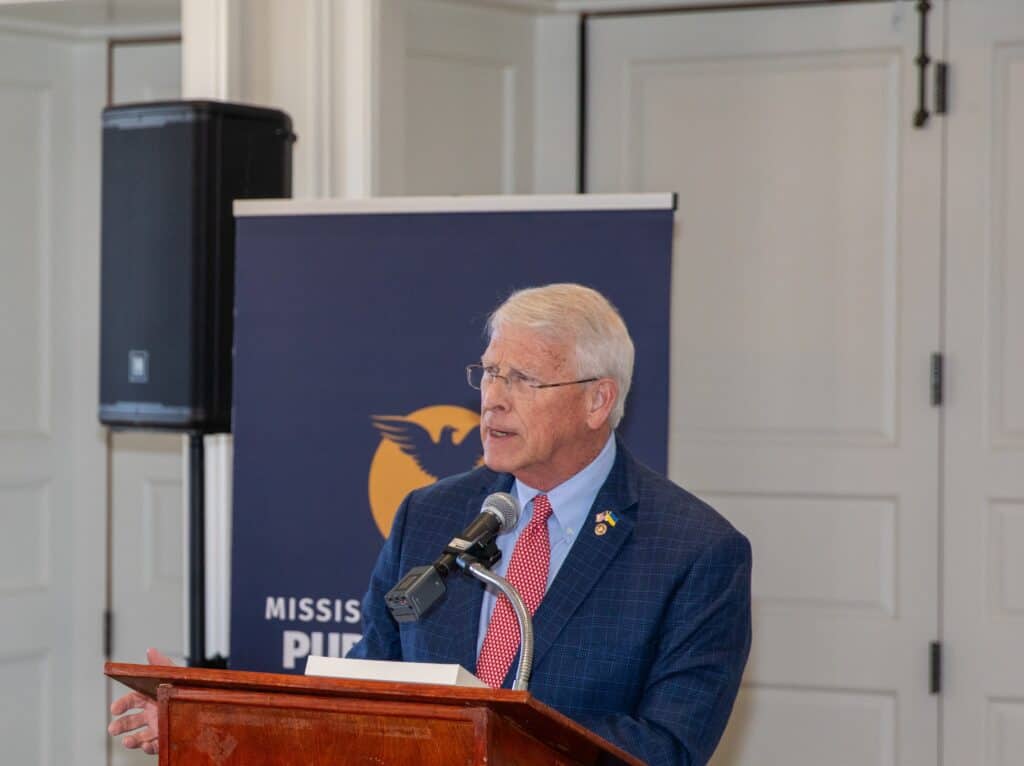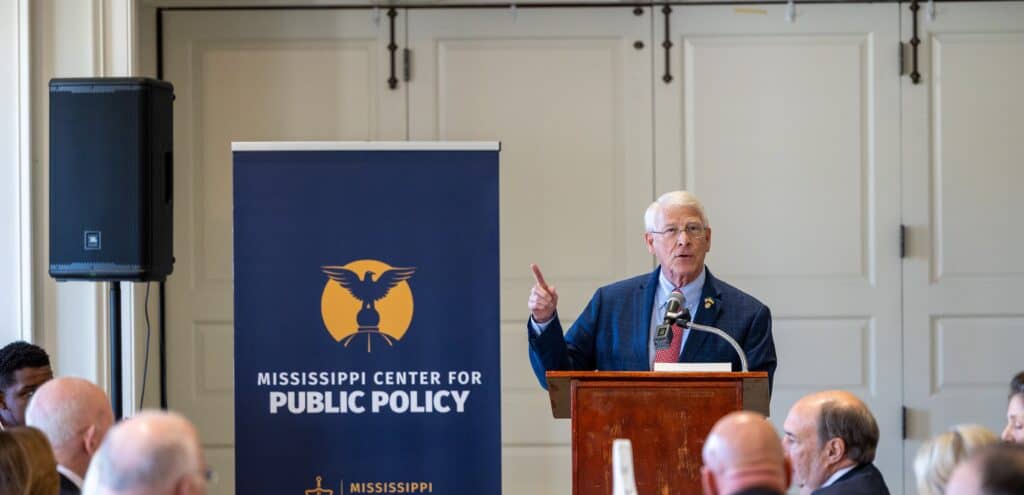The Mississippi Center for Public Policy teamed up with the Heritage Foundation to host a packed lunch with Senator Roger Wicker and leading foreign policy strategist, Michael Pillsbury.
Drawing from his bestselling book about China, “The Hundred Year Marathon”, Michael Pillsbury explained just how easy it is for China to gain access to top-secret American defense plans.
Pillsbury explained how under President Nixon and Henry Kissinger, America initially took a pro-China approach, seeking to engage and assist what was then the world’s most populous country.
China, Pillsbury suggested, has learned our strategy all too well and is able to take advantage of it. Even today, America’s administrative state continues to assist China is ways that are not always in America’s best interest.
Pillsbury went on to suggest that America should adopt a Reagan-era approach of achieving peace through strength, building up our military capability in the hope that we never need to use it.
China, some believe, has made plans to invade Taiwan within the next few years. America needs to prepare for every eventuality.
Wicker went on to emphasize the importance of the US navy and the need to ensure the navy had sufficient strength and capabilities.
Taiwan, both Wicker and Pillsbury agreed, should be strengthened in a way that resembles the defense of a porcupine. While not a proactive threat to anyone, a porcupine’s needles ensure than anything that attacks it risks incurring serious pain. Taiwan, they suggested, can be strengthened to a point where China would reconsider making any move on the island state.
This past session, Mississippi joined a number of other states in reforming civil asset forfeiture laws.
Lawmakers allowed the administrative forfeiture provision to sunset, meaning the previous law ceased to be in effect at the end of June. In response, Mississippi Center for Public Policy and the Mississippi Justice Institute joined with Empower Mississippi and national conservative organizations in thanking the legislative leadership for ending administrative forfeiture in the state.
Administrative forfeiture allows agents of the state to take property valued under $20,000 and forfeit it by merely providing the individual with a notice. An individual would then have to file a petition in court to appeal. This had the net result of requiring the individual to pay an often-large legal bill to get his or her property back. This, naturally, has an outsized negative effect on low-income households.
Asset forfeiture reforms
Until 2017, Mississippi was the wild west of sorts when it came to civil asset forfeiture. In 2015, the Mississippi Bureau of Narcotics, along with local police departments, seized nearly $4 million in cash.
They seized amounts as low as $75. They seized trucks, cars, ATVs, riding lawnmowers, utility trailers, and 18-wheelers; an arsenal of assorted handguns, shotguns, and rifles; cell phones, cameras, laptops, tablets, turntables, and flat screen TVs; boat motors, weed eaters, and power drills; and one comic book collection, according to a report from Reason.
And that does not include numbers from police departments that work independently of the Bureau of Narcotics. Until 2017, they didn’t track or publish asset forfeiture data.
Moreover, family members, especially parents, often have their cars or other property seized for the alleged crimes of their children. This happens even though the parents are not connected to the illegal activity. For example, in 2015, the Desoto County Sheriff's Department agreed to return a 2006 Chevy Trailblazer owned by the mother of the petitioner, Jesse Smith, in exchange for $1,650.
In 2017, the legislature provided needed reforms. Now, seizing agencies must obtain a search warrant issued by a judge within 72 hours of seizing property. And all forfeitures are posted on a publicly accessible website. Repealing administrative forfeiture is another important step.
Voters oppose civil forfeiture
Polling shows a large cross-section of Mississippi voters oppose the practice of civil asset forfeiture.
According to a poll from 2016, 88 percent of voters oppose civil forfeiture, including 89 percent of Republican voters. Every category of Mississippi voter identified in the poll — by race, age, sex, political party and district — is against police taking property from people not convicted of a crime.
By reforming the civil forfeiture system, Mississippi is adopting policies that are in-line with voters in the state and reforms that other states have enacted.
What creates prosperity? Why are some states rich and others poor? Why does Mississippi consistently rank as one of the poorest states in the nation? Can anything be done to move Mississippi 'out of last place?'
Join Brandon Cline and Claudia Williamson, editors of Promoting Prosperity in Mississippi and the Co-Directors of the Institute for Market Studies at Mississippi State University, for MCPP's July 26 Liberty Luncheon as we discuss these questions and how we can truly promote, encourage and experience prosperity in Mississippi.
Here are the details:
WHAT: Liberty Luncheon: Promoting Prosperity in Mississippi
WHO: Featuring Brandon Cline and Claudia Williamson, Co-Directors of the Institute for Market Studies
WHEN: Thursday, July 26, 2018 at 11:30 a.m.
WHERE: River Hills Club, 3600 Ridgewood Rd., Jackson, Mississippi
Space is limited so sign up today.










